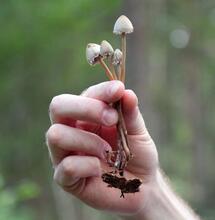Uruguay President Announces Plans to Legally Sell Nationalized Marijuana

José Mujica's government says more damage is done by illegal dealings
José Mujica's government says more damage is done by illegal dealings
SOURCE: 'The Guardian' AUTHOR: Christine Legrand José Mujica's government says more damage is done by illegal dealings. The president of Uruguay, José Mujica, has announced plans to legalise the production and sale of marijuana under a state monopoly, triggering a lively controversy in Montevideo. The relevant bill will soon be tabled in parliament, where the governing centre-left coalition led by the Broad Front (FA) enjoys a majority but is divided on this issue. Possessing and consuming marijuana was decriminalised in 2000. "There is no question of Uruguay producing and distributing drugs, but the state will control and regulate the market," said interior minister Eduardo Bonomi. "We have a progressive tradition," said Bonomi who, with Mujica, belonged to the Tupamaros urban guerrillas in the 1970s. "At the beginning of the 20th century our country ended the prohibition of alcohol, prostitution and gambling." Abortion is currently in the process ofbeing legalised. "Our approach to marijuana is equally pragmatic," Bonomi said. "The negative effects of consuming marijuana are far less harmful than the outbreak of violence associated with the black market." About 300,000 people (8% of the population) occasionally consume the drug. But the domestic market, currently illegal, is worth about $75m, according to the minister. "The main hazard is not marijuana but the dealers who supply much more dangerous substances such as paco [a low-grade cocaine base], which does terrible damage." The government has not made it clear how production will be managed. Mujica has suggested that 150 hectares of land would be sufficient to cover demand, with distribution being entrusted to a "private company" under strict state control. The opposition is critical of the bill, arguing that it will boost drug use without reducing insecurity. Bonomi admits that crime is steadily increasing in Uruguay, but stresses that "it is much lower than neighbouring countries such as Brazil or Argentina." Insecurity is a prime concern for Uruguayans and a main cause of criticism of the president, whose approval ratings have fallen from 66% in 2004 when elected to 40%, according to a recent poll. However, three former Latin American presidents - Fernando Henrique Cardoso, César Gaviria and Ernesto Zedillo, respectively of Brazil, Colombia and Mexico - have called for governments to take control of drugs. Guatemala is in favour of the Mujica plan, and Bolivia is looking at ways of legalising coca leaves. • This article appeared in Guardian Weekly, which incorporates material from Le Monde © 2012 Guardian News
S
Soft Secrets



